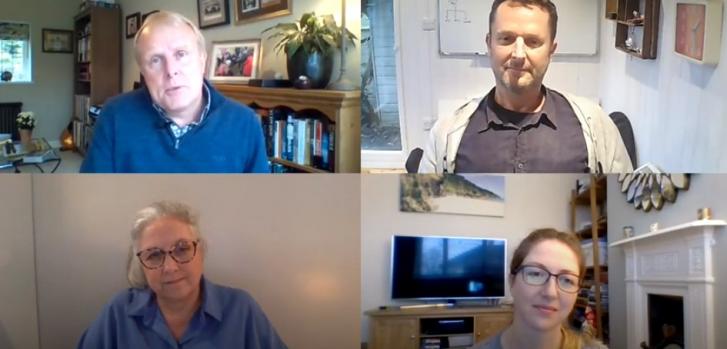
Tough times for creatives won’t stop ideas flowing
The creative sector has been one of the hardest hit by the pandemic. How will it recover? As theatres, museums and galleries faced the second lockdown, OxLEP assembled a panel of experts to consider what the future looks like for the region’s cultural and creative sector during its latest digital Q&A.
Each of the three panellists had turned to digital to help their own creative business survive 2020.
Guy Gadney, CEO of Charisma ai, which turns graphic novels into interactive stories, worked with Oxford’s Creation Theatre in their ‘crazily ambitious’ online production of Alice In Wonderland. Dr Vicky McGuinness, head of cultural programming and partnerships at the University of Oxford, put an entire festival online as the Big Tent! project, celebrating the new humanities building, became a virtual event – and attracted 36,000 people from 23 countries worldwide. Lucinda Whiteley, co-founder of Oxford-based children’s media company Novel Entertainment, told how their much-loved character, Horrid Henry, was given online ‘horrid homework’ after children wrote in to ask how he was coping with home schooling.
But all agreed that while creativity continued to flow, the funds may not in light of the pandemic.
Lucinda said. “Even very large organisations have struggled.” With a high proportion of freelancers – 47% in the arts as opposed to 15% in the general population – many individuals have been hard hit. Guy pointed out that digital does not suit all art forms. “Live music does not work well on screen and not all actors are suited to performing on Zoom. It’s very different.”
Guy took a moment to praise Innovate UK, which this year acted quickly to approve funding for projects. Vicky agreed that the government support has helped, but added that the sector still takes all the risks. “Recovery will be difficult while live venues have reduced capacity. I worry whether experimental and innovative venues will be able to keep their doors open, and there is real concern over access and diversity. Even online is not open to everyone. Opportunities will narrow unless we have a diverse funding model.”
The panel agreed that the value of the arts, and its contribution to society, mental health and wellbeing went far beyond money. When broadcaster Howard Bentham, who chaired the discussion, asked how things will be this time next year, all remained optimistic.
“Artists start with nothing,” said Lucinda adding: “Creative people always try to think their way out.”.
Digital, said Guy, offered fresh opportunities “This year has exposed people to new forms of content and technology. For some creatives, it’s like a new set of paintbrushes. 2021 will be hard economically but it will force out new and brilliant ideas.”
WATCH: OxLEP Digital Q&A: ‘How critical is this time for our cultural and creative sectors?’




